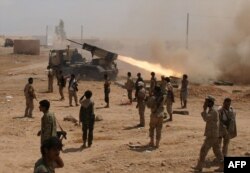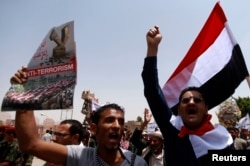U.S. warplanes and drones launched a new wave of airstrikes against al-Qaida terror cells in Yemen this week, part of what is being described as a "larger plan" to contain something military planners see as a growing threat to the West.
Pentagon officials said the latest strikes, early Friday, followed up on the first barrage of strikes Thursday in Yemen's Abyan, Bayda and Shabwah provinces.
Like the initial round of precision airstrikes, targets included fighters, equipment, infrastructure and heavy weaponry belonging to al-Qaida in the Arabian Peninsula, also known as AQAP. Results were still being assessed, but officials said more than 30 airstrikes had been conducted during the two day-span.
Initial reports from Yemen had indicated U.S. ground forces also might have been involved in the efforts, including possible firefights with AQAP fighters, but a Pentagon official said no American troops were involved.
"It was an opportunity. We had to take it," Pentagon spokesman Captain Jeff Davis told reporters Friday.
Davis said the airstrikes were carried out based on intelligence developed prior to the late January raid by U.S. commandos on an AQAP complex in Yemen that killed 14 militants, but also resulted in the deaths of several civilians and a Navy SEAL.
New authorities
Unlike the raid, which required the approval of U.S. President Donald Trump, the decision to launch airstrikes was solely in the hands of the military.The Pentagon said U.S. Central Command made the call under new authorities delegated to commanders by the president.
The Pentagon refused to elaborate on the extent of the new authorities.
"Doing so would allow our enemies to know what might be coming," Davis said. "The goal is for the enemy to be surprised and caught off guard, and that's what we've achieved in the past couple of nights."
U.S. military and intelligence officials have long worried about the threat posed by AQAP, considered to be the most capable part of al-Qaida's terror network, as its leaders have taken advantage of Yemen's civil war to solidify safe havens in several provinces.
A U.S. defense official, speaking on background because of the sensitive nature of the information, said a reinvigorated AQAP was "in the top three, certainly," in terms of threats to the U.S.
"Their personnel strength in the recent past, it's definitely gone up," the official said. "We strongly believe AQAP remains intent on attacking the West, and specifically our homeland."
Former plans
Last August, U.S. homeland security officials said those plans could include an attack on U.S. aviation using high-tech explosives that could evade detection, a capability other officials say the group has continued to pursue.
U.S. officials believe AQAP has amassed 2,000 to 4,000 fighters. The vast majority are thought to be from Yemen, and many also have ties, through blood or marriage, to the tribes that populate the country's ungoverned areas.
Help is also occasionally available from competing terror groups, such as Islamic State, which has a much smaller presence in Yemen.
"ISIS and AQAP get along sometimes," the defense official said.
There are also concerns about what the defense official described as gaps in the U.S. understanding of AQAP's operations and networks.
Still, the official said the "large volumes" of information recovered in the January 29 raid was helping to connect the dots and create a better understanding of how AQAP works.
"There is a broad concern," Pentagon spokesman Captain Jeff Davis said. "While we talk a lot about ISIS, AQAP is the organization that has more American blood on its hands."
Intelligence officials have long considered AQAP as the most dangerous of the al-Qaida affiliates, with a proven capability of carrying out attacks against the U.S.
In 2010, AQAP attempted to send explosives-laden packages to the U.S. The year before, it sent Nigerian-born Umar Farouk Abdulmutallab to detonate a bomb hidden in his underwear on a Northwest Airlines flight on December 25.






